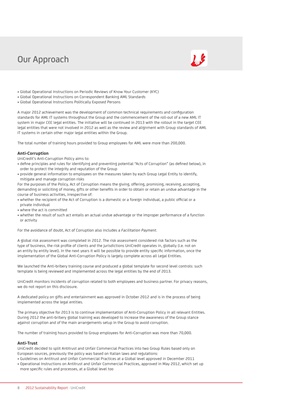
Our Approach
• Global Operational Instructions on Periodic Reviews of Know Your Customer (KYC)
• Global Operational Instructions on Correspondent Banking AML Standards
• Global Operational Instructions Politically Exposed Persons
A major 2012 achievement was the development of common technical requirements and configuration
standards for AML IT systems throughout the Group and the commencement of the roll-out of a new AML IT
system in major CEE legal entities. The initiative will be continued in 2013 with the rollout in the target CEE
legal entities that were not involved in 2012 as well as the review and alignment with Group standards of AML
IT systems in certain other major legal entities within the Group.
The total number of training hours provided to Group employees for AML were more than 200,000.
Anti-Corruption
UniCredit’s Anti-Corruption Policy aims to:
• define principles and rules for identifying and preventing potential “Acts of Corruption” (as defined below), in
order to protect the integrity and reputation of the Group
• provide general information to employees on the measures taken by each Group Legal Entity to identify,
mitigate and manage corruption risks
For the purposes of the Policy, Act of Corruption means the giving, offering, promising, receiving, accepting,
demanding or soliciting of money, gifts or other benefits in order to obtain or retain an undue advantage in the
course of business activities, irrespective of:
• whether the recipient of the Act of Corruption is a domestic or a foreign individual, a public official or a
private individual
• where the act is committed
• whether the result of such act entails an actual undue advantage or the improper performance of a function
or activity
For the avoidance of doubt, Act of Corruption also includes a Facilitation Payment.
A global risk assessment was completed in 2012. The risk assessment considered risk factors such as the
type of business, the risk profile of clients and the jurisdictions UniCredit operates in, globally (i.e. not on
an entity by entity level). In the next years it will be possible to provide entity specific information, once the
implementation of the Global Anti-Corruption Policy is largely complete across all Legal Entities.
We launched the Anti-bribery training course and produced a global template for second level controls: such
template is being reviewed and implemented across the legal entities by the end of 2013.
UniCredit monitors incidents of corruption related to both employees and business partner. For privacy reasons,
we do not report on this disclosure.
A dedicated policy on gifts and entertainment was approved in October 2012 and is in the process of being
implemented across the legal entities.
The primary objective for 2013 is to continue implementation of Anti-Corruption Policy in all relevant Entities.
During 2012 the anti-bribery global training was developed to increase the awareness of the Group stance
against corruption and of the main arrangements setup in the Group to avoid corruption.
The number of training hours provided to Group employees for Anti-Corruption was more than 70,000.
Anti-Trust
UniCredit decided to split Antitrust and Unfair Commercial Practices into two Group Rules based only on
European sources, previously the policy was based on Italian laws and regulations:
• Guidelines on Antitrust and Unfair Commercial Practices at a Global level approved in December 2011
• Operational Instructions on Antitrust and Unfair Commercial Practices, approved in May 2012, which set up
more specific rules and processes, at a Global level too
8 2012 Sustainability Report · UniCredit